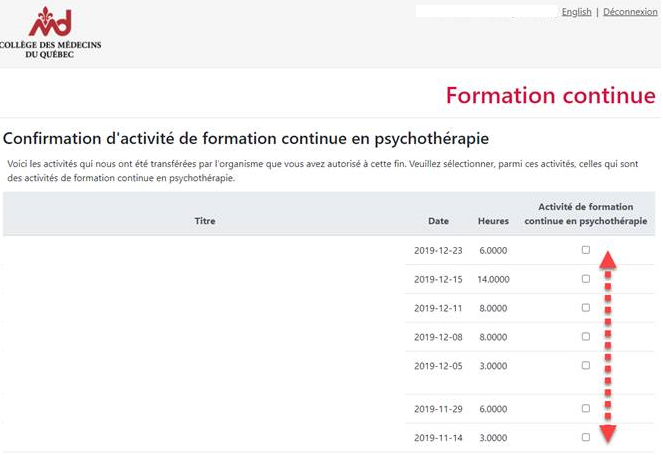FAQ re: Quebec regulation
For more information, also visit our MOC in Quebec webpage
How do MOC credits convert to CMQ hours?
In general:
- 1 credit of Accredited Section 1 MOC activities = 1 CMQ recognized hour
- 3 credits of any MOC Section 3 activity = 1 CMQ recognized hour
- Accredited MOC Section 1 activities transfer to CMQ Recognized Section A.
- MOC Section 2 Bulk online reading/scanning activities transfer to CMQ Recognized Section A.
- MOC Section 3 activities transfer to CMQ Recognized Section B.
Find out exactly how your MOC credits convert into CMQ hours in our mapping table.
Will I be able to fulfil my obligations to the CMQ through the Royal College’s MOC Program?
Yes. Rest assured that the Royal College’s MOC Program will help you meet the CMQ’s requirements and you will not have to report activities twice. We have mapped our MOC Program requirements to those in the CMQ program (credits to hours). We have also expanded MAINPORT ePortfolio’s capabilities to seamlessly report MOC data in alignment with the CMQ’s requirements and platform.
Why should I stay with the Royal College when I could just use the CMQ’s platform, which is included in my licensure fee?
Royal College Fellowship is recognized across Canada as a mark of outstanding expertise. It also shows you are engaged in superior training and committed to lifelong learning. As a Fellow, you have the right to display a premier designation that is recognized worldwide. But most importantly, you have access to the MOC program for your lifelong learning, a program which is respected and recognized by governments and regulatory authorities nationwide. The MOC Program is designed for specialists by specialists and is already the preferred option for more than 8,000 specialists in Quebec because of the many benefits that Fellowship has to offer.
What benefits does MAINPORT ePortfolio have over the CMQ platform?
The CMQ platform will focus solely on CPD reporting. Your MAINPORT ePortfolio is a comprehensive CPD solution with many benefits:
You can track your progress against requirements, access learning opportunities and plan your learning with tools and guidance documents. You will also have a seamless reporting experience that aligns with the CMQ’s new regulation.
In turn, we invest in your success with regular communications, reminders and technological maintenance.
In choosing to remain with the MOC Program, you are choosing to set a personal standard that elevates your CPD to more than the bare minimum. The CMQ recognizes this and the organization is encouraging their licensees to stay with or join existing platforms, such as the Royal College’s MAINPORT ePortfolio.
If I meet the Royal College’s requirements, will I automatically meet the CMQ’s?
If you meet the MOC Program’s requirements, you’ll almost be meeting the CMQ’s requirements. You’ll be in good shape. However, there are some differences between the two systems. For example, the CMQ requires hours of CPD whereas the Royal College requires credits. The CMQ is requiring a minimum of 10 hours of assessment activities over a five-year cycle, whereas the Royal College requires a little over 8 hours (i.e. 25 credits).
Why did the CMQ choose hours instead of credits as the unit of measurement of CPD?
The CMQ decided to make their requirements in hours because that is the unit of measurement mostly used by other professional regulators and associations in Quebec. Since the CMQ must be able to compare their data with those of other orders, they chose an hourly system to be consistent.
How will the 25 credit carry-forward work?
Once your new cycle is launched, a maximum of 75 credits will be carried forward from your previous cycle to your new cycle. You will be able to carry forward a maximum of 25 credits per MOC Program section from your old cycle. We are providing this service to Fellows and MOC Participants to honour under the MOC Program the learning that you have done to date. This data transfer will happen automatically and will not require any additional action from you.
Will those carry-forward credits also count towards my first CMQ cycle?
Unfortunately, no. The CMQ has told us that they cannot consider previously completed activities as part of the first CMQ cycle. Legally, activities must be completed in the period established by the regulation, which is January 1, 2019 to December 31, 2023, in order to be recognized by the CMQ. They made this decision in part so that Quebec licensees who are not MOC Participants or Fellows of the Royal College would not be unfairly disadvantaged.
Can I claim group learning activities accredited by the Collège des médecins du Québec (CMQ) as accredited Section 1 credits?
Yes. We have expanded the definition of accredited Section 1 activities to include activities held in Canada and accredited by a Canadian medical regulatory authority (MRA), such as the CMQ, which follows accreditation standards that are substantively equivalent to those of the Royal College. This means you can claim accredited Section 1 credits for attending activities accredited by the CMQ.
I have a psychotherapy designation. Do I have to do anything special?
Yes. When you review your CPD activities in your CMQ account, please be sure to select at least one activity for your psychotherapy requirements by checking the box next to the activity as shown in the screenshot below (available in French only). This will facilitate the regular transfer of your CPD activities. If you don’t select at least one activity for psychotherapy, your other MOC activities will not transfer to the CMQ platform until you have done so.
More general questions about the MOC Program are answered in our MOC FAQ
